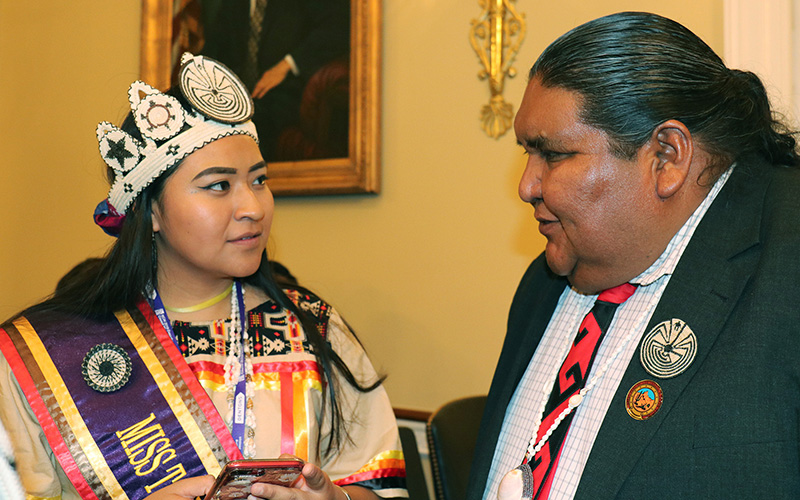
Tohono O’odham Vice Chairman Verlon Jose talks to Miss Tohono O’odham 2019 Maria Keteri Pablo at a House Natural Resources subcommittee hearing on the impact climate change has had on tribal areas. (Photo by Keerthi Vedantam/Cronkite News)
WASHINGTON – Clayton Honyumptewa says the Powamuya ceremony will be observed this weekend as usual on parts of the Hopi reservation, but the planting that traditionally follows the ceremony might not come until May.
The delay is just another example of the effects of climate change that have left dams dry, water scarce – and pushed planting from March to April and then to May, leaving little time for crops to grow.
“Sometimes they don’t even mature because it already gets cold in September,” said Honyumptewa, director for the Hopi Department of Natural Resources. “It’s been really rough on the farmers.”
It’s been really tough on tribes across the country, officials told a House panel looking at the effects of climate change on Native America. Honyumptewa was not there, but stories like his were repeated in testimony Tuesday by tribal leaders from Alaska, Washington and Arizona.
An Inupiaq witness testified that melting glaciers are leading to erosion that threatens rural villages on the Bering Strait, and a representative of the Quinault Indian Nation in Washington said the tribe’s treaty-protected fishing has dried up, while rising seas endanger nearby communities.
Tohono O’odham Nation Vice Chairman Verlon Jose told the House Natural Resources subcommittee climate change has affected everything from farming and livestock to housing and infrastructure.
“We have been able to live off the land, with the land, and with the environmental conditions that it has,” Jose said. But the decades-long drought in Arizona has brought extreme heat and reduced groundwater and surface water needed by crops and livestock.
“As climate change has begun to disrupt both our traditional and modern ways of living, we have had to figure out ways to cope with these changes,” Jose said in his testimony.
The testimony came a day after the president of the National Congress for American Indians urged lawmakers in his annual State of Indian Nations address to take steps toward reversing climate change.
“The science is settled. The evidence? Undeniable. Our world is gravely ill, human beings are the cause, and only we can administer the cure,” said Jefferson Keel, the president. “Climate change threatens our wellbeing, places, and ways of life in every conceivable way.”
-Cronkite News video by Micah Bledsoe
Honyumptewa said he sees it among Hopi ranchers, who cannot afford to properly feed and water their livestock because of scarce resources on the reservation. As a result, livestock and crops have both diminished.
“Some people wholly rely on that. I mean, that’s their livelihood, (their) income for a year,” Honyumptewa said.
Jose said climate change has blunted the tribes’ efforts to get members to return to a healthier, traditional diet as those foods have been “drastically impacted by significant changes in the average temperature that alters the phenology, or the seasonal life cycle, of traditional plants.”
“Our members go out to gather traditional foods and find that many are blooming out of season or not blooming at all as a result of climate change,” he said.
At the hearing, witnesses asked Congress for a seat at the table as the government grapples with climate change, and insisted indigenous experience and expertise should be part of any solutions atimed at reversing it effects.
“We as a community can use best practices, going back to our traditional ways as well as bridging the modern social lifestyles to address climate change,” Jose said.
And while some areas of the Hopi tribe are preparing for the Powamuya ceremony to inspire a successful growing season, Honyumptewa said the drought has made it harder to keep cultural norms alive.
“We need rain, we need water to do that. Rain, snow, all our ceremonies are geared to that,” he said.
“Hopi prophecy is all coming true. Climate change, the California wildfires, they were all predicted by Hopi elders telling us this is what’s going to happen,” Honyumptewa said. “It’s Koyaanisqatsi – a crazy world.”
This story is part of Elemental: Covering Sustainability, a multimedia collaboration between Cronkite News, Arizona PBS, KJZZ, KPCC, Rocky Mountain PBS and PBS SoCal.